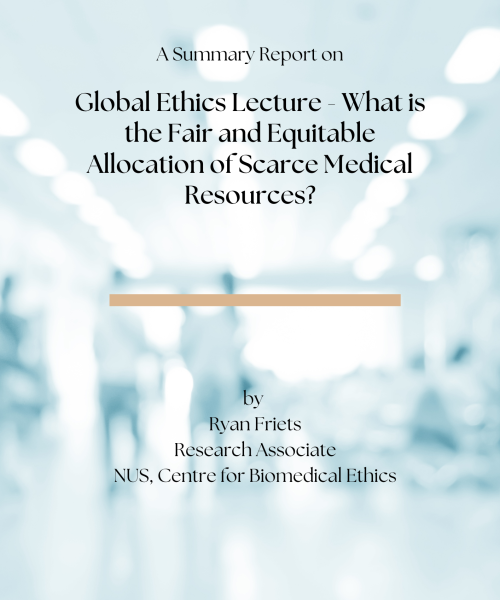Global Ethics Lecture – Dr Ezekiel Emanuel
Biography
Dr Ezekiel J. Emanuel is the Vice Provost for Global Initiatives and the Diane v.S. Levy and Robert M. Levy University Professor, Co-Director of the Health Transformation Institute. From January 2009 to January 2011, he served as special advisor for health policy to the director of the Office of Management and Budget in the White House. From 1997 to 2011, he was chair of the Department of Bioethics at the National Institutes of Health in USA.
Dr. Emanuel received his M.D. from Harvard Medical School and his Ph.D. in political philosophy from Harvard University. After completing his internship and residency in internal medicine at Boston’s Beth Israel Hospital and his oncology fellowship at the Dana-Farber Cancer Institute, he joined the faculty at Harvard Medical School. He has since been a visiting professor at UCLA, the Brin Professor at Johns Hopkins Medical School, the Kovitz Professor at Stanford Medical School and visiting professor at New York University Law School.
Dr. Emanuel has written and edited 15 books and over 300 scientific articles. He is a regular guest on CNN and MSNBC, and often publishes pieces in the New York Times, The Atlantic, and the Washington Post.
Global Ethics Lecture – What is the Fair and Equitable Allocation of Scarce Medical Resources?
Date: Monday, 9 January 2023
Time: 5.00pm
Venue: NUS University Cultural Centre
Abstract
The experience of COVID has helped clarify how to allocate scarce medical resources “fairly and equitably” both within and among countries. The ethical allocation of scarce medical resources entails a three-step process: 1) elucidating the fundamental ethical values for allocation, 2) using the values to delineate priority tiers for scarce resources, and 3) actually implementing the prioritization to faithfully realize the fundamental values.
Myriad reports and assessments have elucidated five core, substantive values for ethical allocation: 1) maximizing benefits and minimizing harms; 2) mitigating unfair disadvantage; 3) equal moral concern; 4) reciprocity; and 5) instrumental value. Importantly, these values are universal, none of the values is sufficient alone, and their relative weight and application will vary by context. In addition, there are procedural principles such as transparency, engagement, and evidence- responsiveness. Prioritizing the values of minimizing harms and instrumental value led to widespread agreement on priority tiers to include health care workers, first responders, people at high risk of death such as the elderly, those with comorbid conditions, and those living in congregate housing.
COVID also revealed problems with the implementation of these values and priority tiers such as allocating vaccine based on population rather than COVID burden and passive allocation that exacerbated disparities by requiring recipients to spend time signing up for and travelling to appointments. This ethical framework should be the starting point for allocation of scarce medical resources in future pandemics and other public health conditions. For instance, the allocation of the new malaria vaccine among sub-Saharan African countries should be based not on reciprocity to countries that participated in research but on maximally reducing serious illness and deaths, especially among infants and children.
Summary Report
Dr Ezekiel Emanuel, Vice Provost of Global Initiatives at the University of Pennsylvania, delivered the inaugural Global Ethics Lecture. He focused on a major area in recent public health discourse: the fair and equitable allocation of scarce medical resources. His lecture was divided into three main areas: (i) Resource allocation in the context of the COVID-19 pandemic, (ii) Allocation for future pandemic scenarios beyond COVID, and (iii) Incorporating Bioethics into Decision-making.
About the writer
Ryan Friets joined the Centre for Biomedical Ethics in 2021 as a Research Associate as part of Clinical Ethics Network + Research Ethics Support (CENTRES). He holds a BA in Jurisprudence from the University of Oxford, as well as an MA in Medical Ethics and Law from Kings’ College London. His dissertation focused on the implications of Non-Invasive Prenatal Testing in public healthcare settings, focusing primary on informed consent and patient autonomy. His current research interests include the regulation of emerging medical technologies and other areas involving the intersect between law and ethics.


